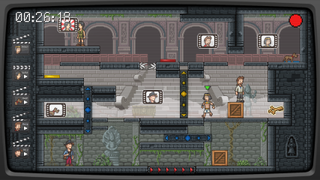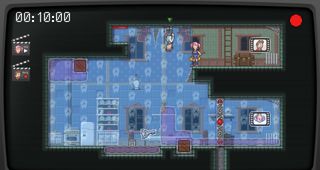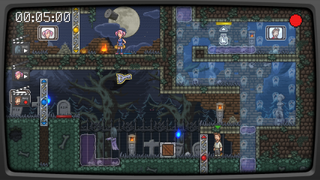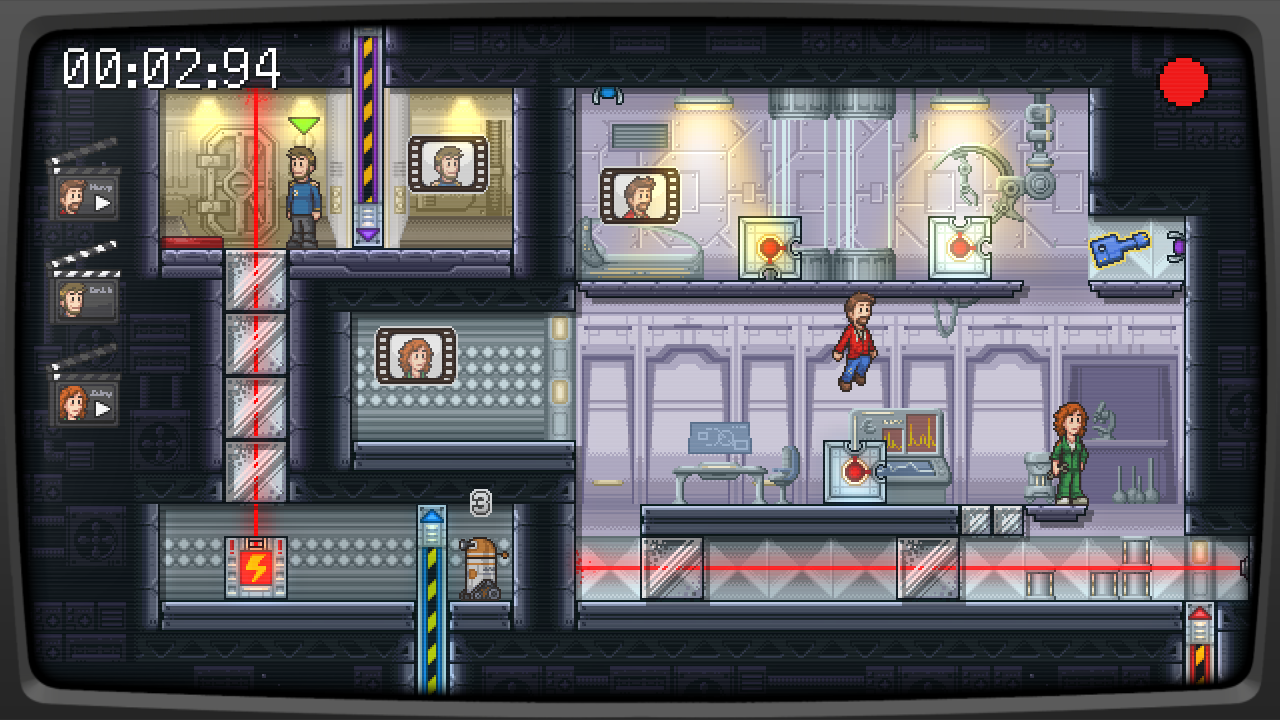Our Verdict
Occasionally punishing, but still a fun, time-bending, mind-rending platformer.
PC Gamer's got your back
What is it: A puzzle-platformer where you control multiple characters by rewinding and replaying their movements.
Reviewed on: Windows 7, Intel i7 x980 3.33 GHz, 9 GB RAM, Nvidia GeForce GTX 960
Release date: Out now
Price: $10 / £7
Developer/Publisher: Neko Entertainment
Multiplayer: No
ESRB: NR
Link: Official Site
"Oh, you moron! Get out of my way!" I scream with red-faced fury at my co-op teammate. After a long, laborious run through a complicated level where absolutely everything worked perfectly, I've just tried to jump over him but he's chosen that exact moment to jump over me, meaning we collide face-first in midair just inches from the exit. No one goes anywhere, and we have to replay the level again. "MORON!"
What's important to understand is that this is a single-player game and my co-op teammate is actually me. In puzzle platformer Replay: VHS is Not Dead, there may be two characters on the screen, there are usually three or four, and at one point, there are five. You control all of them, just not at the same time. And, while I spent time yelling at them (me) when things went wrong, I spent far more time cheering us (me and me and me) when things went right.
Here's the deal: after renting some VHS tapes and being sucked into his television, Harvey Hachess must escape a series of movie-themed puzzle rooms by cooperating with the characters he meets. Each character starts the room in a different spot, and each must reach their own designated exit point. You pick a character and start moving him through the room, and at any point you can rewind time and either move the same character again, or choose a different character. If you switch characters, your original character will repeat the most recent movements you made with him or her while you move your new character. Essentially, it's a co-op game where your teammates are just versions of you from a short while ago.

This quickly grows complicated, as more characters are added and rooms become more complex and dangerous. It's enjoyably mind-bending, as you first try to figure out how the puzzle works, and then try to solve it by controlling different characters at different times who will then all work together at the same time. You can complete most levels at your leisure, but a few have timed devices—like a robot that will begin to push a block five seconds after you begin—which means you can't dawdle.

There are even boss fights, which are the most memorable and satisfying challenges, as they involve real-time threats that can kill you while you're trying to solve puzzles a step at a time. In one boss chamber, a swarm of vampire bats appears at the bottom of the screen and flies upwards. To avoid them, I had to move two characters up one side of the room and a third up the other side. One character had to push a block so another character could climb it to reach a ledge where she could activate a switch to reverse gravity so the third character could be sucked to the ceiling, where he then had to scoot over some spikes, at which point the second character had to re-reverse gravity to allow him to fall safely back down to step on a switch that slid open a wall to allow the other characters to advance. After much experimentation, trial-and-error, timing and retiming and re-retiming the movements of everyone involved, we finally all made it to the top, an absolutely exhilarating feeling—at which point I called myself a moron because I'd forgotten which character was supposed to jump over which.
This is sort of important: rewinding is an all-or-nothing prospect. If you've just completed a long and complicated series of moves, and you goof at the very end, you can't just rewind a few seconds to make a small adjustment. You have to go all the way back to the beginning of your current run, and do the entire thing again with that character. This can sometimes feel aggravating and overly punishing, but more often it feels amazing. When precision, reflexes, and memorization all come together in perfect start-to-finish runs for all of your characters, it's immensely satisfying.

A few drawbacks: the resolution is fixed at 1280x720, though I could play it fullscreen in my 1920x1080 monitor or in a window. The simple controls aren't remappable, and the R key (to rewind a run) and F key (to fast-forward so you don't have to wait in real-time while watching your replays) are adjacent. It would be nice to have those keys further apart, because you don't want to accidentally press R while trying to press F, and have to re-do your current run over again (which I did a number of times).
Plenty of elements in Replay, like time rewinding, gravity-flipping, and laser-redirecting, are familiar from other puzzle games, but they're all used well and combined interestingly here. For the true sadists out there, each level also contains a key, and acquiring that key usually requires a number of additional moves: essentially, it's an extra puzzle within each puzzle. It took me about 12 hours to complete Replay, and that's without finding most of the keys or achieving 'gold medal' times, so that's a good amount of game for the $10 price tag.

Help yourself up while you're helping yourself up.

A boss fight while puzzle-solving with time-clones? Why the hell not.

Knowing what you need to do doesn't always help when you have to do it.

Enchanted Remote Control +5

It's weird telling myself to hurry up but HURRY UP, ME.

I don't remember this happening on Star Trek, but it probably did.
Occasionally punishing, but still a fun, time-bending, mind-rending platformer.

Chris started playing PC games in the 1980s, started writing about them in the early 2000s, and (finally) started getting paid to write about them in the late 2000s. Following a few years as a regular freelancer, PC Gamer hired him in 2014, probably so he'd stop emailing them asking for more work. Chris has a love-hate relationship with survival games and an unhealthy fascination with the inner lives of NPCs. He's also a fan of offbeat simulation games, mods, and ignoring storylines in RPGs so he can make up his own.

Riot has been slowly chipping away at build creativity in League of Legends, all in the name of balance, but there are better solutions

Deus Ex director Warren Spector thinks that 'if someone made Deus Ex today it might be perceived as a documentary,' so if he made a new one it would be pretty different

Today's Wordle answer for Sunday, November 10
